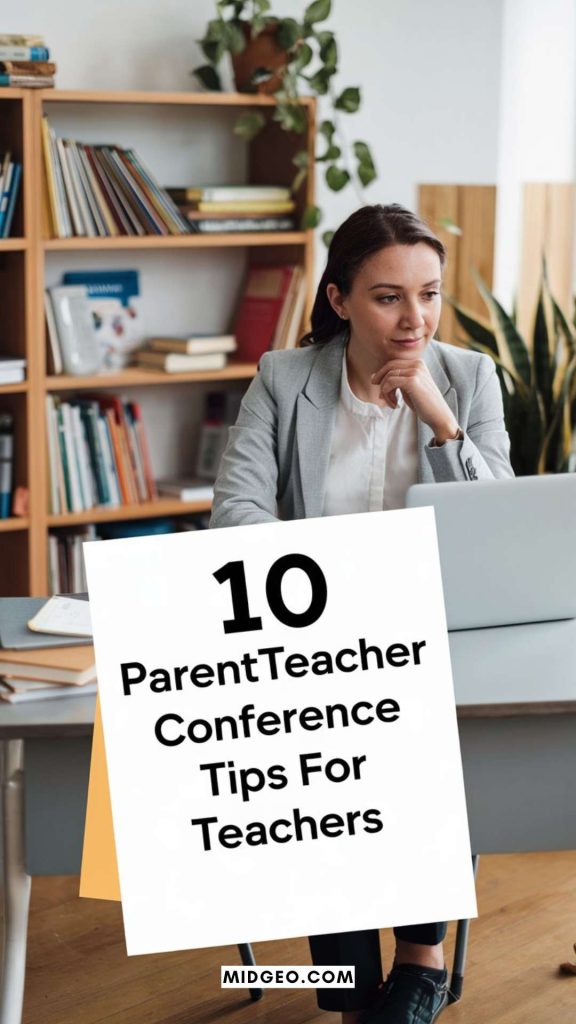10 Parent-Teacher Conference Tips for Teachers

Parent-teacher conferences are essential for fostering strong connections between educators and families. These meetings serve as a platform to discuss student progress, address concerns, and devise strategies for future success.
To ensure these conferences are as effective and collaborative as possible, teachers should approach them with preparation and thoughtfulness. Here are detailed tips to make the most of your parent-teacher conferences:
10 Parent Teacher Conference Tips

1. Prepare in Advance
Preparation is key to a successful conference. Review each student’s academic performance, recent assignments, classroom behavior, and any anecdotal notes you’ve collected. Identify their strengths, challenges, and areas for potential growth. Consider bringing samples of the student’s work to provide concrete examples of their progress and areas needing attention. Having this information at your fingertips will help the conversation flow more smoothly.
2. Create a Welcoming Environment
The setting for the conference can significantly impact its tone. Arrange the seating to encourage open communication—preferably side-by-side or in a semi-circle, rather than across a desk. Personalize the space with student work or uplifting posters, and ensure the area is quiet and free from interruptions. Offering a warm greeting and maintaining positive body language can also help set a collaborative atmosphere.
See Also: Master Your Studies: 3 Secret College Study Tips for Students You Need to Know
3. Set an Agenda
A clear agenda helps ensure the conference stays focused and productive. Prepare a structure that includes discussing the student’s academic achievements, social and emotional development, areas for improvement, and strategies for home-school collaboration. Share this outline at the start of the meeting to set expectations and provide an opportunity for parents to add topics they wish to discuss.
4. Start with Positives
Beginning with the student’s strengths and accomplishments sets a constructive tone and helps build rapport with parents. For instance, share a recent project the student excelled at or praise their improved participation in class. Highlighting positives first creates a foundation of trust and makes it easier to discuss challenges later in the conversation.
5. Be Specific and Honest
When addressing areas for growth or concern, be specific and factual. Use examples to illustrate your points, such as test scores, homework trends, or specific incidents in class. For instance, instead of saying, “Your child is struggling with math,” say, “Your child is finding multiplication challenging and often skips steps in multi-step problems.” This clarity fosters understanding and avoids miscommunication.
6. Listen Actively
Parent-teacher conferences should be a two-way dialogue. Encourage parents to share insights about their child’s behavior, learning preferences, or challenges at home. Listen attentively without interrupting, and acknowledge their concerns and suggestions. This collaboration can lead to a more holistic understanding of the student’s needs.
7. Discuss Solutions and Strategies
Rather than simply identifying problems, focus on actionable solutions. For example, if a student is struggling with reading comprehension, suggest specific strategies like nightly reading exercises or using graphic organizers. Invite parents to share how they can support these efforts at home, creating a partnership in the student’s education.
8. Stay on Schedule
Respect the scheduled time for each meeting to ensure all parents receive equal attention. If a discussion requires more time, offer to schedule a follow-up meeting or call. Use a timer discreetly if needed to stay on track, but ensure the conversation does not feel rushed or incomplete.
9. Provide Takeaways
End each conference by summarizing the main points discussed and agreeing on actionable steps. Provide parents with a written summary or email detailing the key takeaways, along with resources or tips to support their child’s learning. This ensures clarity and serves as a reference for follow-up actions.
10. End on a Positive Note
Conclude the conference by reaffirming your belief in the student’s potential and expressing gratitude for the parents’ involvement. For example, you might say, “I truly believe [Student’s Name] has a lot of potential in [specific area]. With our combined efforts, I’m confident they’ll continue to grow and thrive.”
Final Thoughts
Parent-teacher conferences are an invaluable opportunity to strengthen the home-school connection and set the stage for student success. By being prepared, communicative, and solutions-focused, teachers can foster a partnership with parents that benefits the student’s academic and personal growth. Use these detailed strategies to make every conference a meaningful and productive experience.


